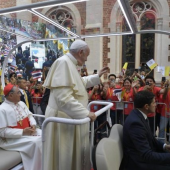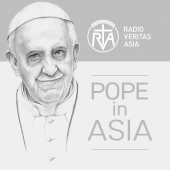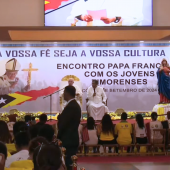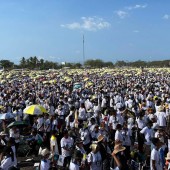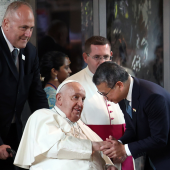Pope Francis again called the attention of the international community to resolve issues of migration that he said have led to the "tragic exodus" of people.
In his first public address during his trip to Asia this week, the pontiff said "conditions" resulting in "movements of migration" have become a "principal moral issue."
"The movements of migration are one of the defining signs of our time," he said in a speech before government leaders and members of the diplomatic corps in Bangkok on Nov. 21.
"The crisis of migration cannot be ignored," said Pope Francis who is visiting the predominantly Buddhist country that has become a major destination of illegal immigration in recent years.
As of October this year, there are 93,283 refugees living in nine refugee camps in Thailand, according to data from the United Nations High Commissioner for Refugees.
Most refugees are ethnic minorities from Myanmar, mainly Karen and Karenni, who live in several camps in four provinces along the Thai-Myanmar border.
Refugees in Thailand have been fleeing conflict and crossing Myanmar's eastern border jungles for nearly 30 years.
In the urban centers, refugees escaping persecutions in countries like Pakistan, Somalia, Syria, and Vietnam are also living quiet lives.
Even as he voiced his appreciation for the Thai government's efforts to address the "scourge" of displacement, Pope Francis expressed hope that the international community "will act with responsibility and foresight" to promote "safe, orderly, and regulated migration."
"I express my appreciation for the Thai government’s efforts to extirpate this scourge, and for all those private individuals and organizations working to uproot this evil and to provide ways to restore their dignity," he added.
"May every nation devise effective means for protecting the dignity and rights of migrants and refugees, who face dangers, uncertainty and exploitation in their quest for freedom," said the pontiff.
"It is not just about migrants," he said. "It is also about the face we want to give to our societies," aded Pope Francis.
He cited "all those women and children of our time, especially those who are wounded, violated and exposed to every form of exploitation, enslavement, violence and abuse."
"Today, more than ever, our societies need 'artisans of hospitality,' men and women committed to the integral development of all peoples."
He said "enabling the service of the common good ... is one of the noblest tasks any person can undertake."
Pope Francis said the challenges facing the world "are indeed global, embracing the entire human family and calling for a firm commitment to international justice and solidarity between peoples."
He lauded Thailand, whose term as chairman of the Association of Southeast Asian Nations is about to end, for showing "respect and appreciation for different cultures, religious groups, thoughts and ideas."
"Our age is marked by a globalization that is all too often viewed in narrowly economic terms, tending to erase the distinguishing features that shape the beauty and soul of our peoples," said the pontiff.
He welcomed the Thai government's initiative to create a "social ethics commission" and for inviting traditional religions in the country to take part "and to keep alive the spiritual memory of your people."
Later in the day, Pope Francis met with Thailand's Buddhist patriarch "as a sign of the importance and urgency of promoting friendship and inter-religious dialogue."
He assured Thailand of the Catholic community's to maintain and promote peace even as they resolved "to confront all that would lead us to be insensitive to the cry of ... (those) who yearn to be freed from the yoke of poverty, violence and injustice."
"We know that freedom is possible only if we are capable of feeling co-responsible for one another and of eliminating every form of inequality," the pope said.
Joe Torres



